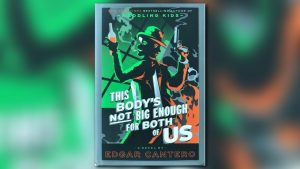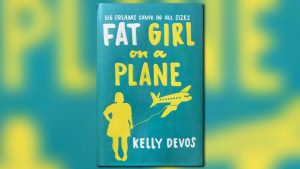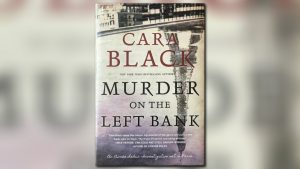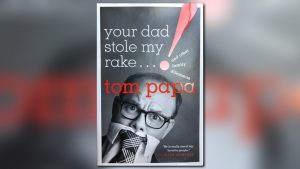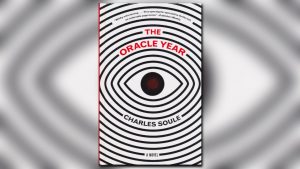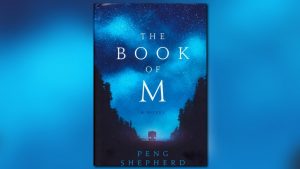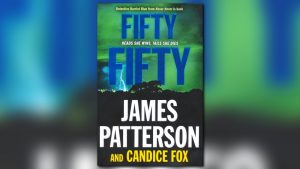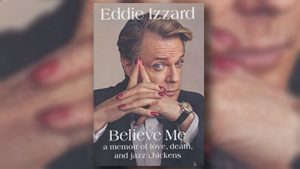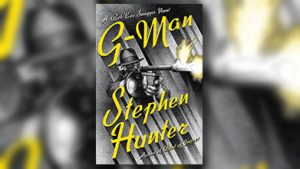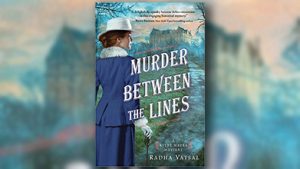Bill Bryson’s “One Summer: America, 1927,” details the various events that occurred in the United States in the summer of 1927.
However, Bryson takes the reader on a journey back to American life providing telling details, humor, outsized personalities and occasional weirdness.
His novel takes readers to historic events such as when Charles Lindbergh became the first man to cross the Atlantic, when Babe Ruth hit his record-setting home run, and when Al Capone held a tight grip on the illegal sale of alcohol.
Other events that his readers are taken back to include when the first true “talking picture,” Al Jolson’s “The Jazz Singer,” came out, a murder trial that became a huge tabloid sensation, and the massive relief efforts of the American South after the flooding of the Mississippi basin.
VOICE OVER: And now an Eight original production.
VOICE OVER: "Books & Company" is made possible by the Virginia G. Piper Center for Creative Writing, serving writers and readers in the Phoenix metropolitan area, the state of Arizona and the world.
ALBERTO RÍOS: Welcome to "Books & Company." Bienvenidos, todos. I'm your host, Alberto Ríos. We're joined today by Bill Bryson, best-selling author of the most remarkable book I've read in some time, "One Summer: America, 1927". Published by Doubleday. Welcome, Bill.
BILL BRYSON: Well, thank you, it's a pleasure to be here.
ALBERTO RÍOS: Well, this book, it's difficult to know where to start because it's full of so much of itself. That is to say that title, "One Summer: America, 1927", sums it up but does not sum it up at all.
BILL BRYSON: I wanted to be a little enigmatic about what was in there and I fought very hard with the publishers to keep a photograph of people off the front because to me, I never intended to write a book about this one summer. I was going to write a book that was just about Charles Lindbergh and Babe Ruth because those were the two big characters that summer, it was the summer, 1927 that Babe Ruth hit 60 home runs and the summer that Charles Lindbergh flew the Atlantic and as that was about it. Otherwise, it was a perfectly ordinary summer. What I found as I started doing the research, was two things, one, Ruth and Lindbergh were much, much more complex and interesting than I thought and their stories needed a whole lot more telling but also it was a staggeringly eventful summer. It was the most magical summer in America's history I think and it was just one thing after another. You had the jazz singer, the first talking picture, the great Mississippi flood, still the biggest natural disaster in terms of scale in American history, you had the execution of the notorious anarchist Vanzetti, they started carving Mt. Rushmore and the invention of the television. It was just one thing after another. That's just some of the things and I couldn't believe it when I was doing the research, that all this stuff happened in the summer of 1927. And almost everybody who was alive and important that summer, Henry Ford, Al Capone, Calvin Coolidge they were doing really consequential things for their own careers. That’s why the book became more about the summer rather than just the two characters that dominated.
ALBERTO RÍOS: Well, the force of facts here is overwhelming. It's just powerful. And as you mentioned it's a cast of characters that we couldn't have invented. And the output, people doing consequential things but the inconsequential things that were interesting, they just abound and the facts that you talk about are just -- you have them on every page. And I don't know if 1927 as you were saying you were going to write about Babe Ruth and Charles Lindbergh so I'm wondering did this book come to you after the fact or did you go in search of it once you started it?
BILL BRYSON: It pretty much came to me after the fact. I mean, I had long had it in mind to try to do a dual biography of these two guys. I thought that would be an interesting challenge of writing the biographies two of people simultaneously and my goal was no more ambitious than that. And then I found all this other stuff was happening. And as you say, I mentioned all the kind of consequential things but there was just lots and lots else going on. There were things like flagpole sittings, the great fad that obviously didn't change the world, had nothing to do with making America great or anything like that but it completely dominated people's thinking and it attracted crowds of tens and thousands of people to watch people sitting on flagpoles. It's almost the only area where there wasn't a whole lot going on with the arts, music and literature were both fairly quiet that year compared with the rest of the '20s.
ALBERTO RÍOS: You talk about the nascence of the Book-of-the-Month Club and literary guild coming soon thereafter and how much publishing was actually going on.
BILL BRYSON: I make the case, I think a valid one, that it was probably the greatest year ever for reading because it was essentially the last year before talking pictures and it was the last year before network radio really took over. Still quite a ways from television but in 1927, if you had time to kill and nothing else to do, it was really you read. And to me that's a pretty good world right there. But, you know, there weren't so many other distractions.
ALBERTO RÍOS: You talk about people idolizing in essence authors which we don't think of today coming to watch the writing of Elmer Gantry, for example, when he came to write it, that people gathered and just tried to watch him.
BILL BRYSON: Yeah, they wanted to see him. He was that big a celebrity. It was a strange time because it was really the birth of the modern celebrity culture there and Babe Ruth is kind of the quintessence of that. He was -- before Babe Ruth, baseball players were famous and they were celebrated but they were celebrated for what they did on the field. Babe Ruth was the first time that somebody was being celebrated for what he did off the field as well as on. And people loved him for that. And, you know, they couldn't get enough of him, wanted to know what he was eating, wanted to know as I say in the book when he had his bunions trimmed, they wrote newspaper articles about it. That had never happened. That kind of creation of the celebrity culture was really, really taking off and Ruth loved it and Charles Lindbergh interestingly absolutely hated it. He did everything he could to run away, spent his whole life trying to run away from being famous. He didn't want people nosing around in his private life and taking pictures in his face and that kind of thing.
ALBERTO RÍOS: You talk about this dual biography of Ruth and Lindbergh but you have a dual biography going on as well with the two presidents who were in play, vice president at the time, Coolidge and Hoover, which I found pretty extraordinary and it wasn't a sidebar. It was part and parcel of the book but I was learning things I had no knowledge of that were just pretty interesting.
BILL BRYSON: Well, it was an interesting time. Coolidge is a strange guy. I came away from the book really liking him. And certainly I felt sorry for him. The thing -- Coolidge was conspicuously a hands-off president. As a matter of policy he believed in small government and believed that the United States should not interfere with anything other than the very few jobs that a president really, really has to do. But Coolidge wouldn't even endorse national education as a matter of policy. He felt it wasn't the job of the president to get involved with it. So when something like the great Mississippi flood came along, a lot of people said this is too big for the states to handle, the federal government needs to get involved and he was very much against it. It was an interesting philosophical argument going on at that time which obviously echoes still today.
ALBERTO RÍOS: Loudly.
BILL BRYSON: Very loudly today. But it was an interesting time and then in the midst of all this, Coolidge announced that he doesn't want to run for re-election. He's not going to run for re-election in -- in 1928. He was extremely popular. He would have walked into the White House. He would have won in a land slide. He opened the door for Herbert Hoover who was a very unlikable human being but really a very, very efficient and effective man. He had been known as a great humanitarian.
ALBERTO RÍOS: His background in Belgium, I didn't know about that. That was an extraordinary piece of history.
BILL BRYSON: Yeah, well, he was an American businessman, he became a very rich American businessman based in London at the time the first World War broke out and he became the go-to guy when they needed an American to solve in Europe and one of the things he did was he ran all the food aid programs. People in Belgium, they were caught right in the middle of all the great battles, devastating Belgium and the people were starving. They were cut off on both sides. There was a blockade that was stopping food from the allies. The Germans weren't letting food come in. So finally people were in serious serious peril of starving and Hoover organized food relief for them, extremely effectively. He was known as a great humanitarian and he became one of the most popular people on the planet, the Europeans absolutely loved him. After the war was over, he did the same thing for the whole of Europe while all these people that were starving in the wake of the war or were, you know, in a really bad way, he make sure that plenty of food aid got to them. So he was a great heroic figure and would probably have remained so, except that he happened to be in the White House at the time of the great depression which really he can't be blamed for and yet he's the one that is popular blamed for the great depression.
ALBERTO RÍOS: What's interesting, too, is he does this all but he only does it administratively. He's got no personal connections to any of it, it feels like.
BILL BRYSON: There's no warmth in the guy. And I tried really hard as a loyal Iowan, I grew up there and he's the most famous Iowan, I tried everything, I tried to bend over backwards to be generous to him as much as I could but he was genuinely not a very likable guy. He wasn't a villain by any means but he was very, very cold, you know, and he had no warmth, people who worked with him didn't like him, he never inquired about your health, if he knew your wife had been unwell, he would never ask how she was doing. People found him extremely, extremely icy, distant, aloof fellow. That's a great shame because I suspect all people like that, underneath, there's a nice person trying to get out and doesn't know how to do it.
ALBERTO RIOS: If Coolidge seemed inattentive, Hoover seemed hyper-attentive and it seem to me that that attention to detail, I don't know what we would make of that today but it was so extraordinary and as he later brought it to the great flood, I don't know how we would conceptualize that focus without other social niceties around it. We might have medical terminology applying to it which struck me.
BILL BRYSON: The thing that struck me, it was a completely different age. This was still an age when a man like Coolidge could go out for a walk around Washington, you know. He didn't answer his own phone but hadn't been so long since presidents had actually employed a secretary to answer the phone. I believe that Harding actually answered his desk phone when it rang and when you look at the amount of sort of support they had in security and all of that, it was minimal. They were about as important as the state governor in modern times. They were not these people way up on a pedestal and I think that's quite refreshing. It was really --
ALBERTO RÍOS: Funny thing to imagine right? I would like to take a moment to remind our viewers you're watching "Books & Company," I'm your host Alberto Ríos. We're joined today by Bill Bryson talking about his wonderful book, "One Summer: America, 1927". Well, as we were going through this and I was talking about inconsequential things, I was thinking there were so many wonderful -- and it's resident in the details. When I say inconsequential, it doesn't mean that they don't matter, they're just so intriguing by themselves, I'm thinking, for example, of Lindbergh cutting the white parts of his maps off so he didn't have extraneous weight.
BILL BRYSON: He was -- Lindbergh was completely obsessional about getting the weight down on the plane and for very good reasons. He barely cleared the wires at the end of the runway and that was the problem. That's why people had not flown from New York to Paris before is because planes, you had this problem and you needed so much fuel to get across the ocean but it was too much fuel for planes to take off with and it was only the recent advent of air-cooled engines which were lighter which made this possible, but only just. All these pilots, all of them when you read about what they did just before the flight, they were jettisoning things, anything at all that they could shed. So Lindbergh, obviously, knew, it was more of the psychological gesture that he was getting rid of those things. Obviously, he knew that wasn't going to make the difference between taking off and crashing but you can certainly imagine if you were in that position, you would be doing everything you could.
ALBERTO RÍOS: Every psychological edge. It strikes me in retrospect, we say of course, you should be shedding things but the litany of things that they had to shed was pretty funny. The way they dressed, nobody knew how to do this yet.
BILL BRYSON: Some of them, there were lots of teams. I had always thought that he had flown just for a vacuum. I thought he gotten it into his head that he would like to fly to Paris and he did it but, in fact, there was a big race going on. And there were lots and lots of teams. So eight or 10 teams both in Europe and in America that were poised to do it. Lindbergh was by far the outsider. Everybody thought he was out of his mind because all the other teams were better funded, had bigger planes with multiple engines and multiple man crews. And Lindbergh flies in -- he's only 25 years old, he flies in from Minnesota and announces that he's intending to fly in a single-engine plane by himself, no navigator, no copilot or nothing and people thought he was completely crazy but actually what he proved was that was the most sensible way to do it because one person in the plane makes the plane a lot lighter. You can take that much less fuel. But it does mean the one person has to do all the piloting and stay awake for 36 hours.
ALBERTO RÍOS: After he did it, it was just incredible how the world changed, both the world proper and his own personal world.
BILL BRYSON: Yeah, completely.
ALBERTO RIOS: And the extent to which people gathered to make this so is just exceptional. I don't know that we've ever witnessed anything since.
BILL BRYSON: I don't think there's ever been an outpouring, an outburst of joyous emotion for anything ever like this. The only thing that you could liken it to be: the happiness when wars end. But when you think about it, when a war ends, half of the combatants are on the losing side so they're not really celebrating and everybody has some tinge of melancholy because everybody's lost loved ones. It's not a completely 100 percent joyous occasion whereas with Lindbergh, the whole world knew he was this kid, on his own, flying off to Europe and he vanished, nobody knew whether he was going to make it, for over 16 hours.
ALBERTO RÍOS: No tweeting.
BILL BRYSON: So the tension was just almost unbearable and when he emerged on the other side, he was the most famous person on the planet without a doubt and treated like a savior. That was what was sort of so --
ALBERTO RÍOS: You point out something pretty interesting. I mean, that said, people imagine that this was the future, they didn't -- you have a wonderful part where engineers, people themselves I suppose weren't thinking about highways. They were thinking about airplanes going from city to city and dirigibles. Very different world.
BILL BRYSON: The America 1927, I mean if we were to take America right now, the things would strike us how empty it was compared to now. There was only about 40 percent as many people as now so cities were a lot smaller. And getting between them, between most cities, there were no paved highways at all. It was train travel was what connected you. And the wave of the future where people assumed, they weren't thinking we'll have highways and everybody will drive. They were thinking that something through the air, dirigibles or people through the air, partly because the distances were so great. They couldn't imagine getting quickly from Chicago to Phoenix or Chicago to San Francisco.
ALBERTO RÍOS: Well, there's an odd connection to Arizona in your book. And it's the de Pinedo incident where the -- he was fascist-- I don't know if the word was being used.
BILL BRYSON: It was.
ALBERTO RÍOS: He was the fascist aviator from Italy who was doing a circuit around the world almost, not in the way that Lindbergh was going to make this singular flight.
BILL BRYSON: He's a remarkable character, kind of endearing. He was a strutting fascist. He was just like Mussolini. He had that same kind of posture, that sort of strutting, thrusting his chin out and what he did was while all the rest of the crews, airplane crews were struggling to get airborne and a lot of them were crashing and vanishing, they would take off and not make it, they would disappear, so while most of them were failing to get anywhere and the American teams in particular before Lindbergh took off were really struggling to get away, what he did is he flew from Europe to South America to the United States but he did it, he had his sea plane so he didn't have to fly as far. It wasn't the same kind of thing but it was still quite an impressive feat and while all these other people were struggling in New York to get airborne and failing to, he was flying around on a kind of victory tour all over the United States in a fairly arrogant sort of way. He was slightly insufferable about the whole thing, and then he got to Arizona as you say and landed at Roosevelt Lake and he had to land on water and he was refueling because he was doing some service on the plane in order to fly to San Diego, and apparently, they drained the oil from the engine, the oil was on top of the water and some bystander flew a match on the water and his plane went up and for a long time, the Italians were convinced that this was sabotage, somebody had done it on purpose and it caused an international incident. But he never really did anything great after that.
ALBERTO RÍOS: It's a great story.
BILL BRYSON: And completely forgotten. I mean, it was really, really hard for me to track down any of the facts on it because he was so completely forgotten.
ALBERTO RÍOS: Well, so many things here as you write them go from being forgotten to being now remembered and I think some of the joy in that is simply reveling in information and, you know, I don't know as readers what we expect anymore, maybe we rely on plot in ways that are, you know, to our detriment ultimately. The information here is ultimately important. And it is powerful. When you say that something like 40 percent of everything that was being produced in the world was being produced in America in 1927, 40 percent of everything that was being produced in the world, and the importance of New York City all by itself. I don't think we grasp that.
BILL BRYSON: And, you know, 40 percent of everything was produced, 80 percent of movies, 80 percent of cars. Economically we dominated the world but what was interesting was that we didn't sort of dominate it culturally or America didn't have the level of confidence that we've got now and it's really strange. That America still looked to Europe for leadership and kind of for decision making. And we absolutely led the world economically but didn't have the confidence to make a lot of the decisions that affected the world.
ALBERTO RÍOS: That quiet little insertion, though, that now that America was producing movies, you were hearing the American voice right in all of these places.
BILL BRYSON: The talkies changed, you know. It didn't matter so much. People didn't necessarily equate America with moviemaking when movies were silent, but as soon as it was all American voices that were coming out. The talkies had devastating effects for lots and lots of foreign actors who spoke with foreign accents. But it also meant that suddenly every voice that people heard in places like New Zealand and Canada was an American voice and that really had a huge psychological effect on people. It put America right at the center of the earth.
ALBERTO RÍOS: Well, and you have humor in here, too. I mean, can information be humorous? It certainly can. And you're not writing a funny book per se but you have these great moments that I would be remiss if I didn't mention them. I'm thinking, for example, of John Reid's description --
BILL BRYSON: It was like Andrew Jackson --
ALBERTO RÍOS: He has the face of Andrew Jackson three years dead.
ALBERTO RIOS: Things like that that I think humanize this in a way that also give us a very good sensible picture.
BILL BRYSON: I wanted the book to be fun. I wanted it to be entertaining. It was a period of, you know, not only seriousness but this kind of silly euphoria and there was a zaniness and I wanted the book to have some of that spirit. And jokes like the one you just quoted, those aren't mine jokes but those are jokes made by people at the time.
ALBERTO RÍOS: I think people were -- you talk about the one announcer who was announcing all sorts of things, when somebody got good at something, they get to do it ubiquitously, I think of the electrocutioner, the guy who was announcing everything, giving -- we didn't have television, we didn't have actual visible, you know, communication yet so we had all these people wanting these things, making them happen, almost imagining them into presence. And '27 seemed like the year.
BILL BRYSON: Yeah, yeah, yeah. It was the year. For radio it was definitely the year. Radio was becoming popular but 1927 was the year network radio came along and Lindbergh had a big role in that because it was when he returned to America, the celebrations were so immense that everybody everywhere wanted to listen into it and that was a huge spur to hook up all the radio stations all over the country in a great big national radio hookup.
BILL BRYSON: At the beginning apparently anybody could start a radio station. It was just like C.B. radio a few years ago. And yeah, you just had a little bit of equipment, you could start it up and that's the way the radio was for the first six or eight years, little insurance companies or a poultry farm. Anybody who was kind of crazy about radio.
BILL BRYSON: They could set up a station.
ALBERTO RÍOS: Which strikes me as both democratic and yet not feasible and we have wrestled with that ever since.
BILL BRYSON: And it brings us straight back to Herbert Hoover. He thought it was getting preposterous and out of hand so he was the one that insisted that a certain measure of professionalism be brought to the whole enterprise. So Hoover did a lot of great things and yet all we equate him with was the great depression and the crash.
ALBERTO RÍOS: I think Coolidge had some unkind words for him but they were only unkind in that he was doing so much, Hoover, and Coolidge was not.
BILL BRYSON: And Hoover was sort of transparently ambitious and Coolidge was very disdainful of him and called him wonder boy because always busy and the whole cabinet referred to him as the secretary of commerce and the undersecretary of everything else.
ALBERTO RÍOS: Which is pretty good. Well, everybody might have been able to have a radio station but not anybody, not everybody could have written this book and I want to thank you for that.
BILL BRYSON: Well, Thank you.
ALBERTO RÍOS: This is a book that I found compelling and it brought me to think about things in ways that I simply had not. I didn't know to. And books that can bring us to that point I think are valuable. So thank you.
BILL BRYSON: Thank you very much.
ALBERTO RÍOS: We've been talking today with Bill Bryson, about his most recent book, "One Summer: America, 1927". I'm Alberto Ríos, we're "Books & Company," thank you for joining us today. And we hope to see you again very soon with another good book.
BILL BRYSON: Thank you very much.
VOICE OVER: "Books & Company" is made possible by the Virginia G. piper center for creative writing, serving writers and readers in the Phoenix metropolitan area, the state of Arizona, and the world.





